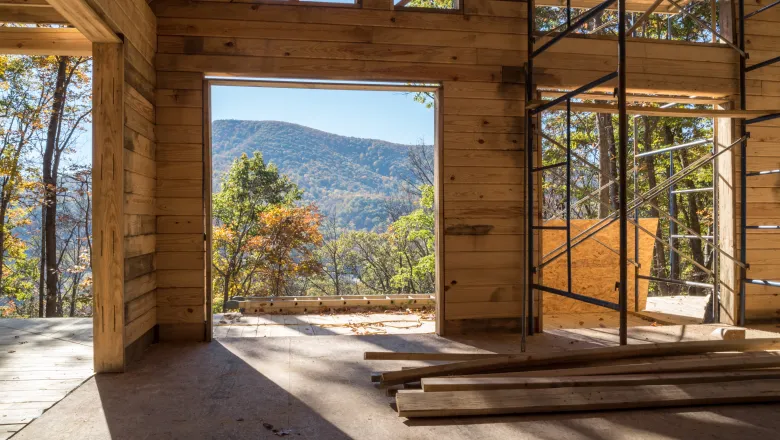Construction Financing Glossary of Terms

Home & Land Financing
Ready to start building your dream home? Acquiring construction financing and navigating a lengthy build can be a daunting, especially for first-time homebuilders. To ease the process, we compiled a list of commonly used terminology and definitions.
Still have questions? Let us be your guide. Contact us online or give us a call at 1-800-919-3276 to talk construction financing with a local lender.
Annual Percentage Rate (APR): The percentage relationship of the total finance charge to the amount of the loan, over the life of the loan. Do not confuse APR with your quoted interest rate, which is used to determine your monthly principal and interest payment. The APR reflects the cost of your mortgage loan as a yearly rate. It will be higher than the interest rate stated on the Note because it includes (in addition to the interest rate) loan points, fees and mortgage insurance.
Appraisal: A report written by a qualified professional that states an opinion on the value of a property based on its characteristics and the selling prices of similar or comparable properties in the area.
Appraisal Inspection: During construction, the appraiser will visit the property when a draw request is received. They will use the original construction plans to determine the level of completeness in order to confirm the construction is on track and draw funds can be released.
As will be appraisal: An appraisal utilizing the property plans for the home/building and construction specifications to determine the value of the property as if the home/building was already constructed.
Certificate of Occupancy (also called Occupancy Permit): Written authorization given by a local municipality that allows a newly constructed, or substantially renovated, structure to be inhabited. Class A Contractor: A Class A general contractor license/certificate holder is authorized to construct or demolish, or deconstruct, any building or structure that is regulated under the building code, including all work authorized by license types below this level.
Closing Costs: The costs paid by the mortgage borrower (and sometimes the seller) in addition to the purchase price of the property. These include, but are not limited to, the lender’s fees, title fees, and appraisal costs.
Contractor’s License: A certification issued by a governing body (state) that the contractor is a professional in their field and has met all the qualifications to construct.
Cost Overrun: Any dollar amount that exceeds the agreed upon contract price. Most cost overruns are caused by lack of detailed plans, changes in the original plans, material cost increases and weather. All cost overruns must be approved by the lender prior to the work taking place.
Draw: The funds pulled from the construction loan proceeds to be used to pay contractors, building materials and labor expenses for the construction of your home. Draw Schedule – A detailed payment plan for a construction project that is agreed upon by the contractor, client and lender.
Down Payment: A portion of the sales price paid to the seller by the homebuyer to close the sales transaction. Also, the difference between the sales price and the mortgage amount.
Homeowners Insurance (also called Hazard Insurance): A real estate insurance policy required of the buyer to protect the property against loss caused by fire, natural causes, vandalism and other events. May also include added coverage such as personal liability and theft away from the home.
Interest Rate: The portion of the mortgage amount that is paid to the lender for the use of the money advanced through the loan, usually expressed as an annual percentage.
Interim Interest: The interest that accrues, on a per-diem basis, from the day of closing until the end of the month.
Loan-to-Value (LTV): A ratio that calculates the amount of your mortgage based on the appraised value of the property.
Manufactured Home: A pre-fabricated structure at an off-site facility that is transported to a building site and placed on a foundation. These homes are permanently attached to the chassis used during the initial construction.
Modification Process: A change made to the terms of an existing loan by the lender. At the end of construction, your loan MODIFYS from a short-term construction loan to a long-term fixed rate loan.
Modular Home: A pre-fabricated structure at an off-site facility that is transported to a building site. The modules are set using a crane to complete the dwelling.
Patronage: Cash dividends issued to Farm Credit customer-owners on a yearly basis based on the association's financial performance, which effectively lowers the cost of borrowing.
Prepaids: The portion of your loan closing costs which must be collected at closing to cover taxes, interest and insurance.
Prime Market Rate: An interest rate set by the Federal Reserve that your lender will use to set the cost of borrowing funds for your construction.
Rate Lock: The borrower and the lender agree to protect the interest rate, points and term of the loan while it is processed. This protection has an expiration date.
Secondary Mortgage Market: The marketplace where home loans and servicing rights are bought and sold between investors and lenders.
Stick Built Home: A wooden structure (dwelling) constructed entirely on-site.
Survey: A drawing, prepared by a registered surveyor, showing the legal boundaries of a property.
Title Bring-down: Your closing agent must search public records to confirm the title insurance is clean in order for draw funds to be released from the construction funds.
Variable Rate: An interest rate that may change during your loan period due to the economy and rates set by the Federal Reserve.